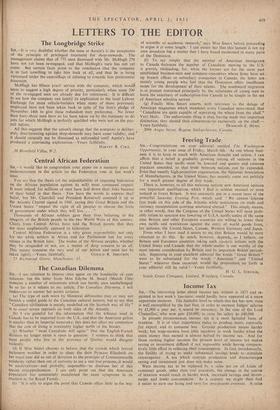The Canadian Dilemma
Sup, I am reluctant to impose once again on the hospitality of your columns. but the letter from Miss Edythe M. Smart (March 13th) contains a number of statements which can hardly pass unchallenged. In so far as it relates to my article, The Canadian Dilemma, 1 will endeavour to answer her points seriatim.
(a) The type of sash worn by Montreal debutantes may or may not furnish a useful guide to the Canadian cultural pattern, but to say that "Canadian civilisation is mainly modelled on the Scottish way of life" is to court severe reprisals on both sides of the Atlantic.
(b) I am grateful for the- information that the tobacco used in Canada has to be imported from the U.S.. and that the American gallon is smaller than its Imperial namesake; this does not affect my contention that the cost of living is noticeably higher north of the border.
(c) Whether "most Canadians will agree" that the English-French division no longer exists is open to question, I venture to think that most people who live' in the province of Quebec would disagree violently.
(d) If Miss Smart chooses to believe that the crowds which braved inclement weather in order to cheer the then Princess Elizabeth on her royal tour did so out of devotion to the principle of Commonwealth solidarity rather than out of curiosity to see a real live princess, it would be unchivalrous—and probably impossible—to disabuse her of this quaint misapprehension. I can only point out that the American Population has consistently manifested the same symptoms in its reaction to the Royal Family.
(e) " It is silly to argue the point that Canada offers little in the way of scientific or academic research," sacs isc Smart before proceeding to argue it at some length. can assure her that this lament is not my own invention but a matter that I have heard mentioned in many parts of the Dominion.
(f) To say simply that the number of American immigrants to Canada %balances the number of Canadians moving to the U.S. is gravely misleading; for, while the former are for the most part established business-men and company-executives whose firms have set up branch offices or subsidiary companies in Canada. the latter are mainly young people who feel that the Dominion offers insufficient scope for the development of their talents. The southward migration is, at present restrained principally by the- reluctance of young men to leave the sanctuary of cor1scription-free Canada to be caught in the net of American selective service.
(g) Finally Miss Smart asserts, with reference to the deluge of American magazines which inundates every Canadian news-stand, that "Canadians are quite capable of separating the wheat from the chaff." Very likely. The unfortunate thing is that, having made this important distinction, they should then concentrate's° exclusively on the chaff.—
,


































 Previous page
Previous page